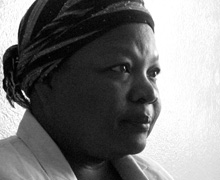The Unitarian Universalist Service Committee advances human rights through grassroots collaborations.
Stories of Hope: Malya Villard-Appolon
 Natural disasters often make current inequalities even worse. The earthquake that shook Haiti in 2010 was no exception. While violence against women was a problem even before the earthquake, women and girls living in tent camps for earthquake survivors experience increased violence on a regular basis. But Malya Villard-Appolon, UUSC partner and 2012 CNN Hero, is working to stop that.
Natural disasters often make current inequalities even worse. The earthquake that shook Haiti in 2010 was no exception. While violence against women was a problem even before the earthquake, women and girls living in tent camps for earthquake survivors experience increased violence on a regular basis. But Malya Villard-Appolon, UUSC partner and 2012 CNN Hero, is working to stop that.
For many years, Malya has worked to end violence against women in Haiti as cofounder of the Commission of Women Victims for Victims (known as KOFAVIV). When the disaster struck, KOFAVIV’s clinic was destroyed, along with its records. Despite the loss, Malya understood that women and children were more at risk than ever, so she continued to work through the chaos. Malya knows firsthand the difficulties that women who have been assaulted face — she is a survivor of violence herself and has even been threatened at gunpoint to stop her work. That has made her even more determined to help other women find justice and peace in their communities.
In the spring of 2011, UUSC brought teams of medical volunteers to Haiti to help KOFAVIV care for survivors of violence against women. KOFAVIV now supports women in several ways. Survivors are offered immediate medical care and someone to go with them to the hospital after being attacked, and they receive information about how to avoid infections and stay healthy. Women may also seek support in taking legal action against the people that hurt them. Sadly, very few perpetrators are ever tried in court, as Haiti’s judicial system is often corrupt and controlled by bribes and threats.
Mental and emotional support is just as important as legal support for survivors. When a woman has gone through an assault, she sometimes feels she does not deserve her rights. KOFAVIV affirms the inherent worth and dignity of women so they have the self-esteem to take a stand for their rights. With help from other UUSC partners, KOFAVIV helps women deal with stress and learn ways to feel better.
Women survivors of violence often have money and belongings stolen, too, and sometimes their homes are even burned. KOFAVIV offers survivors financial support that empowers women and their families, and the organization also teaches skilled crafts (such as sewing) that women can use to make a living. They also have programs for children and teenagers who have been affected by violence.
In addition to helping women heal, KOFAVIV helps prevent future violence against women and girls. KOFAVIV makes sure there are female camp workers around different areas that women use. Since many women do not trust male leaders within the camps, the women workers are an important resource for women residents. Malya is working to provide women with separate showers and toilets so they may take care of their most basic human needs in safety. She distributes whistles and also asks for increased police presence and better lighting to make it safer to move around the camps.
The most important part of Malya’s work is helping women to speak out about the violence they’ve encountered. Survivors often feel alone and afraid — but KOFAVIV teaches women how the power of their combined voices can lead to a movement that will transform their lives and their communities. With the help of UUSC and KOFAVIV, women are building a new Haiti where all can live free from violence.
Go deeper and take action
-
Explore how UUSC defends human rights in humanitarian crises.
-
Learn more about how UUSC partners help Haitian communities recover from trauma in Workshop 4 of UUSC’s Beyond the Mountain Haiti curriculum.
-
Make a donation to UUSC today at uusc.org/givetoguest. UUSC does not accept any government funds or denominational support — our members and supporters sustain this vital work!